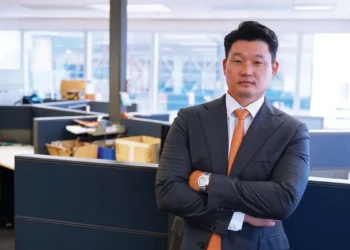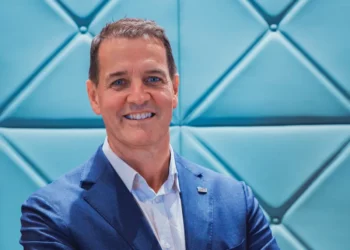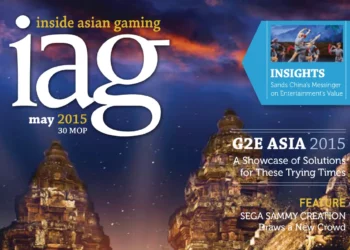A technology strategist specializing in gaming and game design, skill-based gaming, gamification and general entertainment, Hai Ng’s expert insights have become highly sought after on the global gaming conference scene. Inside Asian Gaming chats to the affable eSports maestro and co-founder of technology strategy and management group Neomancer.
Oscar Guijarro: Tell us a bit about your background Hai and how you got to where you are now.
Hai Ng: Where am I now? I started pretty young, I definitely started before I was a teenager – I was probably around nine or ten. In my first job I built a database for managing mailing lists. My brother was working for a restaurant so I helped him print direct mail labels. This was in the early ‘80s, so Apple II, 8-bit, that kind of stuff. Ever since I was a kid I loved computers.
OG: So a career involving computers in some way was always on the cards?
HN: It’s all self-taught. I am from a lower middle class family in Singapore, we couldn’t really afford to have computers. In the early years my friends and I would hang out at computer stores. They didn’t really mind us because we knew how to use their stuff. Sometimes we knew how to use their stuff better than they did, so we would just go there and learn programming. We taught ourselves.
I guess the first computer thing I ever owned was a floppy disc, because I couldn’t afford a computer but I could afford a floppy disc.
OG: So how did your passion become your career?
HN: I was a big Apple fan right from the beginning. My first computer was an Apple II bootleg because I couldn’t afford a real one. I actually wrote a letter to Apple and said, “Look, the reason your sales are so bad in Singapore is because your guys don’t know how to sell this.” At that time the CEO of Apple was John Sculley and I sent the letter via registered mail. I was about 15. A few weeks later I actually got a reply from Apple Cupertino, saying, “Thank you very much for your concern, we have forwarded your letter to Apple Hong Kong.”
I then received a letter from Apple Hong Kong saying they had notified my local distributor to address my concerns and subsequently I got a call from one of the sales managers. He said, “You are causing a lot of trouble here, so if you think you can do better than why don’t you come in and prove it?”
My first day on the job I managed to sell a Mac and they hired me! I was actually underage and technically they couldn’t hire me so they asked me what I wanted instead. I said, “I just want a computer,” so I got a Mac.
OG: There was no formal education then?
HN: In Singapore we have military service, so I went into the army and did computers. I built software for my officers to help track things. I did mostly reports – I could generate custom reports. Then I was offered a job straight out of the army. I never went to university, I’m self-taught on everything. But I was offered a job and became director of a company, sort of a partner. I started doing some work directly for Apple and I was one of the evangelists. They would fly me most of the time to Hong Kong to do talks.
OG: You came to the United States in 1993 which eventually led to you obtaining a specialist visa. From there you helped Boeing with virtual modelling and even exhibited at the Museum of Modern Art of New York. Where do you get the inspiration for such developments?
HN: That’s what we do and that’s the kind of stuff that I do. I solve problems. As a user interface person, I always say that my challenge is the last six inches – the space between the screen and the human. What I try to do is not change the human but change the computer, because process is important. It’s like when we designed this thing for the New York Stock Exchange, for Goldman Sachs.
I worked as a surrogate expert. I worked on the floor of the New York Stock Exchange for several weeks shadowing brokers and clerks, then I went upstairs to talk with the traders, to understand how they think, how they visualize a trade, how they do their job, what the process is.
My belief is that with any process that has been around for so many years, so many decades, there has to be some intrinsic value that has evolved into the process. It would be arrogant for us to think that we can do better than that process. What we did was, instead of trying to replace it, we wanted to understand it and then think about how we could make it better or efficient. We actually took the process and turned it into a user interface for the device. The beauty of it was that after we developed it, the users didn’t need an instruction book. When they saw it they knew exactly what it was because we actually took what was conceptually in their head and put it into the interface. No manual. No training. Everybody could use it. And it works so well that it became the gold standard for Goldman Sachs.
OG: Those were the years prior to the founding of Neomancer?
HN: Yes. In 2001, 9/11 hit us really hard. We were in New York and we couldn’t get into our office for months. We were working for the banks and half the banks were destroyed. We even lost a friend in a tower. My partner decided to fold so I went back and did some work with Columbia University.
OG: Where did the name Neomancer come from?
HN: The reason I came up with Neomancer was that we had a lot of clients that would come to us and say “Wow! What you’re doing is magic,” so we thought, “Okay, we’re the new magician.” That’s what Neomancers do – it’s the Latin word for new magician.
When we started Neomancer, we were kind of tired of working for companies, so we did an interesting thing – we said, “Look, we’re concierge technologists.”
We work for high-net-worth individuals with few technologies. We have some celebrities as clients – directors, actors and producers, bankers – and we take care of their technology needs. We help them buy phones, manage their computers, privacy issues.
We are a very small company but our clients trust us so much that we’re actually in some of their wills! Should they have an accident and die, we get their computers. We also have orders on how to purge their computers. We will get all their data, we will be told who gets to see what and then the computer is destroyed. It’s an interesting line of work.
OG: How did Neomancer lead you to iGaming?
HN: One of our clients wanted to get into iGaming. He wanted us to build a program for him to do box pools, an electronic version of it, which we developed. We even developed a specialized RNG to generate the numbers and we have a US patent on that, which my colleague owns. While we were doing that, they needed a place to host it, so they told us, “There is this place in Canada in Mohawk Territory called Mohawk Internet Technologies, why don’t you come up with us and check them out?” In other words, audit them and see if they’re good enough.
We met with the owners and eventually we did something with them. The data center became Continent 8 Technologies, one of the biggest data center and infrastructure providers for iGaming in the world today.
I was CIO for them for a while and then Director of Asia, so I brought them into Singapore. We got government permission to host gaming provided we don’t target Singaporeans.
OG: And how does eSports fit into that?
HN: We started doing fantasy sports about four or five years ago and a guy came to me with an idea for daily fantasy. This was before DraftKings and all those guys. This guy actually owns one of the patents to daily fantasy sports, because he was a big fantasy player – a season-long fantasy player. He came up with this idea that the most exciting part of fantasy sports is the draft so why don’t we come up with a game where you can just keep drafting? He did that and we worked with him for a little bit, I did a lot of conferences. I started doing a lot of speaking, so I did a lot of shows about fantasy sports and then eSports. You know, fantasy sports hit a wall really hard. We were telling them, “Look, it is gambling. You should get regulated.”
They said, “No, no, no, we’re not gambling.”
“Alright, fine…”
OG: So the focus on eSports was accidental?
HN: You know I have always been a gamer. Back in the ‘80s when I was doing computers, the first thing you do after you learn how to program is you learn to crack stuff, so I have always been a gamer.
When eSports started coming around in the late 1990s there was the World Cyber Games but it really never caught on. My theory is that back then there was no Twitch. You could play but the network wasn’t that great, to get together and play was really expensive and if you did get together, who was going to watch it? There was no way to watch a proper broadcast.
The second time eSports came around I thought, “Okay, this is interesting.”
For me growing up, I’ve always been the weird one. The “never went to school, built my own computer” sort of guy. What’s interesting about eSports is that anybody can be an eSports athlete. It doesn’t matter if you’re a man or a woman, it doesn’t matter your race, it doesn’t matter if you’re tall, short, fat, thin … it doesn’t matter. You can find a game that you can be good at.
OG: Do you still play?
HN: Yes, I travel with my PS4. I started doing eSports probably mid-2016.
OG: How will eSports impact on traditional gambling?
HN: I think gambling will stay. The games will change. I think a lot of the games that gambling has been using, it’s been too long since they’ve changed. That’s unusual because a lot of things evolve, just look at the telephone. Alexander Graham Bell wouldn’t even recognize a telephone today but if you look at the slot machine, it hasn’t changed. Even though it now has a screen and it’s electronic, it’s still the same.
OG: Can you see a “change in the game?”
HN: Gambling will stay, but operators and game developers need to innovate. Games have become so specialized in the language that they use, the attitude that the dealers have, the operators have. It’s become prohibitive for somebody who is new, who doesn’t understand the game to play. I think the industry in some cases is killing itself by doing that – and that’s from the operators’ perspective. From the regulators’ perspective, they are not working fast enough. By the time they approve something, it’s already old tech. It’s not moving fast.
I think regulations have to catch up with technology. It’s not like millennials don’t like to gamble, they just don’t like the games being offered to them. A lot of the attitude has to change. It’s not so much luck any more, it is skill. Customers want skill games, they want social games, they want games where they can share their experiences with their friends. It’s not so important to win money, it’s more important to win respect, it’s more important to win achievements and accolades.
OG: Where do you see yourself in five years?
HN: I don’t know. I’m always looking for challenges. Deep down I’ll always be a technologist. What makes me wake up in the morning is having a problem to solve. I like to solve problems. I have crazy travel schedules but the silver lining in me travelling the world is that I see problems, which is a challenge and I enjoy it.
What I love the most is for people to bring me their problems and say, “Hello, solve this, what can you do?” That’s the great thing. What I think is even more valuable is finding a problem that is worth solving. I hope I can do that for a long time.

































